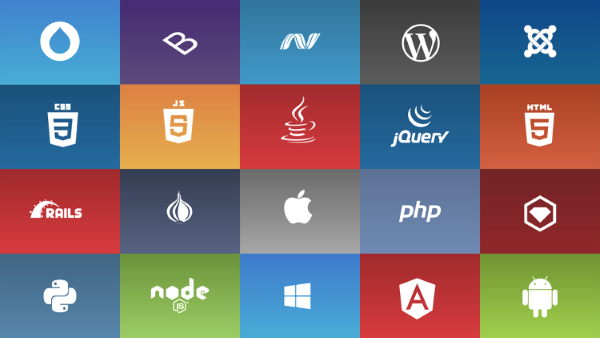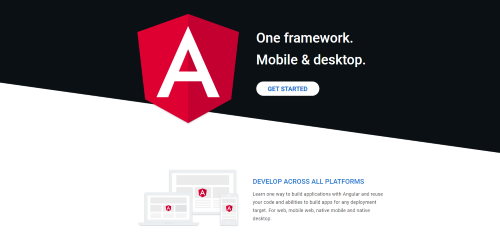Think of building an app like you are building a house. When you are building a house, you have to choose: you can either create your own building materials like cement, paint, and bricks from scratch. Or, you can purchase building materials from the market.

Web development is similar. JavaScript frameworks are like purchasing manufactured building material and then changing it according to one’s requirements. JavaScript is the heart of web and app development. According to the Stack Overflow Report of 2019, around 67.8% of the developers use JavaScript for web development.
Front-end developers can now choose from different JavaScript frameworks that best suits their needs. In this article, we will look at different JavaScript frameworks that power front-end development.
What Are Front-end JavaScript Frameworks?
Front-end JavaScript frameworks are like a library of pre-written JavaScript codes that help a front-end developer during the development phase of the app or a website. JavaScript frameworks are quite popular in the development industry because of its ease of use, flexibility, and multi-platform capabilities. Currently, there are more than 50 different frameworks that are used for front-end development.
Why JavaScript Is The Best Option For Front-End Development?
There are different alternatives available for JavaScript when it comes to front-end development, for example, Dart, TypeScript, Elm, etc. However, most of the websites are running on JavaScript, like Google, YouTube, Baidu, Tmall, and many more. Here are a few reasons why JavaScript frameworks are the best option for Front-End Development:
- JavaScript frameworks can be used across different platforms, including mobile, desktop, browser, etc.
- JavaScript frameworks can handle a high level of complexity in terms of app development. That is why popular websites like Netflix and PayPal are built using these frameworks.
- JavaScript frameworks offer the option of a feedback loop, which enables developers to get instant results and run multiple codes.
Top 5 JavaScript Frameworks for Front-End Developers
If you are looking for the best JavaScript framework for front-end development, then here are the top 5 most popular frameworks for front-end developers that are currently dominating the market.
1. Angular.js
Angular.js is one of the best and most used frameworks for front-end development. This framework is designed by Google. It is a top pick for developers because it offers excellent solutions and has multiple options. For example, it features simple code development, two, way data binding, easy testing, etc.

The angular framework has the capability to handle the front-end development of large and powerful applications because it offers a fast production of code and also allows the developer to see changes that might be happening in the back-end. It also has stable support as it is backed up by Google. However, it does require more optimization to tackle certain performance issues.
2. React.js
React framework is backed by Instagram and Facebook. With over 1,000 contributors on GitHub, React.js is one of the most popular JavaScript Frameworks for front-end development. React offers better performance for apps as compared to the Angular framework because it uses a virtual DOM. It is used by over 38% of the developers and is the first choice for businesses like Netflix, PayPal, BBC, etc.

Some of the pros of React.js is that it offers a lot of online resources, documentation, and also server-side rendering. It is also fast, flexible, and more reliable. However, if you are using the React framework, keep in mind that it may be incompatible with certain codes and other JavaScript libraries that may modify the DOM.
If you are confused, Magento development service providers can help you get started and ensure a successful app development project.
3. Vue.js
Vue.js is a newer framework as compared to others, developed by Evan You in 2013. It has become quite popular in the web development sector because of its high performance, simplicity, and ease of use. It is also a popular choice among developers because it can easily be integrated within an application.

It is one of the top three JavaScript frameworks, and it also integrates seamlessly with other HTML elements. However, its major con is that there is less availability of resources, and it has less market than the above two frameworks (i.e., Angular and React).
4. Node.js
Node.js framework is popular among developers who are working on fast and scalable networking apps because it is capable of handling a large number of connections, thus offering higher scalability. Node.js is the best option for you if you are looking for a JavaScript framework with all the tools and options. According to a survey, around 51.4% of the respondents said that they prefer using Node.js, among other frameworks.

Node.js is a server-side framework that allows you to work on cross platforms. It is also an open-source framework, making it the most downloaded framework for JavaScript code. One of the main reasons behind its popularity is its non-blocking IO system, which allows developers to process multiple requests simultaneously.
5. Ember.js
Ember.js is an open-source JavaScript framework with an MVVM pattern (Model-View-View-Model). This framework is mostly used to make single-page applications, and it is also a great option for building complex applications that require a lot of data. Due to its full-featured functionality, Ember.js is also used to create data management flow in web applications.
It is one of the top 5 JavaScript frameworks because it offers better performance and documentation for front-end developers. Apart from performance, it also has a high level of scalability, making it a perfect choice for both desktop and mobile applications. And that’s not all! It also comes with its own tool for debugging called the Ember Inspector.
Final Thoughts
These are our top picks of the best JavaScript frameworks for front-end development. Each framework has its own benefits and features that make it unique. All these frameworks come with their pros and cons, so you need to select the right one for you, depending upon your project type and needs. When you are choosing the best framework for your development project, make sure to compare the performance, documentation, and architecture of each framework. Good Luck!
Author Bio:
Arslan Hassan is an electrical engineer with a passion for writing, designing, and anything tech-related. His educational background in the technical field has given him the edge to write on many topics. He occasionally writes blog articles for Dynamologic Solutions.